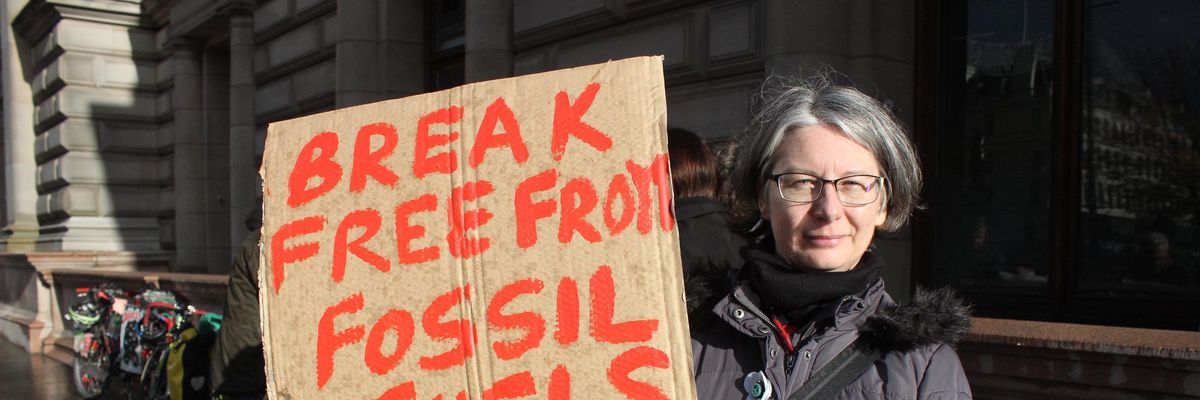As banks, insurance companies, and institutional investors face mounting criticism worldwide for their contributions to the destruction of the planet, a report published Wednesday exposes how U.S. public pension funds are "bankrolling the climate crisis."
"With 10 years of data, there's hard evidence: Divestment is a winning financial strategy."
The advocacy group Stand.earth and Third Rail Economy researched 14 funds in the Climate Safe Pensions Network (CSPN) and "flagged $81.6 billion in assets, or 5.9% of all fund assets, as likely 'fossil fuel' holdings," according to the report.
CSPN, a "network of city, county, state, and national pension divestment and shareholder advocacy campaigns" across North America, is coordinated by Stand.earth, which pressures corporations and governments to prioritize people and the environment.
"Public pension funds are the quiet culprits of climate chaos," said Amy Gray, Stand.earth's senior climate finance strategist, in a statement. "With 10 years of data, there's hard evidence: Divestment is a winning financial strategy. The fastest way for pensions to address climate change is to divest fossil fuel holdings and invest in just and equitable climate solutions."
Stand.earth's statement highlighted some key findings from what it called a "first-of-its-kind" report.
"Nine of the funds listed in the report invest over $281 million in TC Energy, the company behind the controversial Coastal GasLink pipeline violating Indigenous rights in Wet'suwet'en land, including militarized police raids in British Columbia, Canada," the group noted. "The pension funds also have over $3.24 billion invested in big tar sands miners Canadian Natural Resources, Cenovus, ConocoPhillips, Exxon, and Suncor."
The 14 analyzed funds are based in Alaska, California, Colorado, Illinois, Maine, Massachusetts, Minnesota, New Jersey, New York, Oregon, and Washington. They include the Chicago Teachers' Pension Fund.
Educator and divestment organizer Nick Limbeck noted that the world is rapidly nearing the 2015 Paris agreement's 1.5degC temperature threshold, "which will trigger climate feedback loops that will send global warming spiraling out of control, yet our Chicago Teachers' Pension Fund still has $600 million invested in fossil fuel companies."
"As teachers, we are called upon to nurture the next generation," Limbeck said. "The time is now to divest from fossil fuels. Let us give our students a chance to live and thrive in a world without climate catastrophe."
"Let us give our students a chance to live and thrive in a world without climate catastrophe."
Three of the analyzed funds are from the Golden State: the California Public Employees' Retirement System (CalPERS), California State Teachers'' Retirement System (CalSTRS), and San Mateo County Employees' Retirement Association (SamCERA).
"It is unconscionable for any fund, especially teachers' pensions like my CalSTRS pension, to continue investing close to $16 billion in an industry that has caused this existential climate crisis," said Jane Vosburg, a fund beneficiary and Fossil Free California board president.
"Costly wildfires throughout the state have already razed communities and schools and relocated and traumatized our students," she continued. "Since 2014, teachers, like me, students, and local teachers' unions representing 160,000 beneficiaries have been urging CalSTRS board members (two of whom support divestment) to divest."
Related Content
'We Lost Everything': Greenville Residents Reel as California's Dixie Fire Grows to Historic Proportions
Brett Wilkins
Taking aim at another fund from the report, Maine Youth for Climate Justice said that "the primary duty of the Maine Public Employee Retirement System (MainePERS) is to ensure that the pension fund is well-funded and protected from large and unnecessary risk."
"These fossil fuel companies are exactly the kind of risk that they are mandated to minimize," the organization added. "The bottom line is that fossil fuels are not a safe investment for Maine, not safe for future generations, and not safe for the public employees relying upon this pension fund to support them as they age."
Devon Reynolds, a University of Colorado graduate student employee and Colorado Public Employees' Retirement Association (PERA) member, pointed out that some divestment supporters have already provided a model for those still investing in fossil fuels to follow.
"PERA should follow the lead of the New York state comptroller, who announced that his office will decarbonize the pension fund's full portfolio by 2040 with interim targets, completing a systematic review of all fossil fuel investments within four years, including divesting from any companies which don't have a plan to leave fossil fuels behind," Reynolds said.
"This includes transitioning their business away from oil and gas production, servicing or transportation, and alignment with the Paris climate agreement," Reynolds added. "PERA must divest from fossil fuels."
The report also highlights similar moves by "iconic, sector-leading institutions like Harvard University and University of Toronto, Dutch and Canadian pension fund giants PME and CDPQ, French public bank La Banque Postale, and the Ford Foundation and John D. and Catherine T. MacArthur Foundation," and declares that the divestment movement "has reached a threshold moment."
Related Content
'The Tide Has Shifted': Harvard to Divest From Fossil Fuels After a Decade of Pressure
Jake Johnson
According to the Global Fossil Fuel Divestment Commitments Database, 1,500 institutions around the world representing $39.88 trillion in assets have made some sort of pledge to ditch the climate-wrecking industry.
"The divest-invest movement is absolutely having an impact," the report says. "Fossil fuel companies are losing their political power. Wall Street has been forced to agree that the movement is making it harder for the industry to raise capital and complete new infrastructure. That is critical if we are going to succeed in limiting carbon emissions."
The report calls for the movement to "go even bigger" by demanding that all pensions funds: publicly commit to fully divesting from fossil fuels; move to invest at least 5% of their assets in climate solutions, doubling to 10% by 2030; and adopt net-zero plans in line with the 1.5degC Paris goal.
Deborah McNamara, campaign director at 350 Colorado, framed divestment as "an ethical responsibility" given that "maintaining the status quo of fossil fuel energy production and investments will unquestionably lead to a self-created catastrophe."
"Attempting to profit from investments in companies whose profits depend almost exclusively on the continuation of practices that cause climate breakdown (and adding insult to injury, losing money on those investments) is unacceptable," she said, "and puts Colorado and PERA on the wrong side of history."







